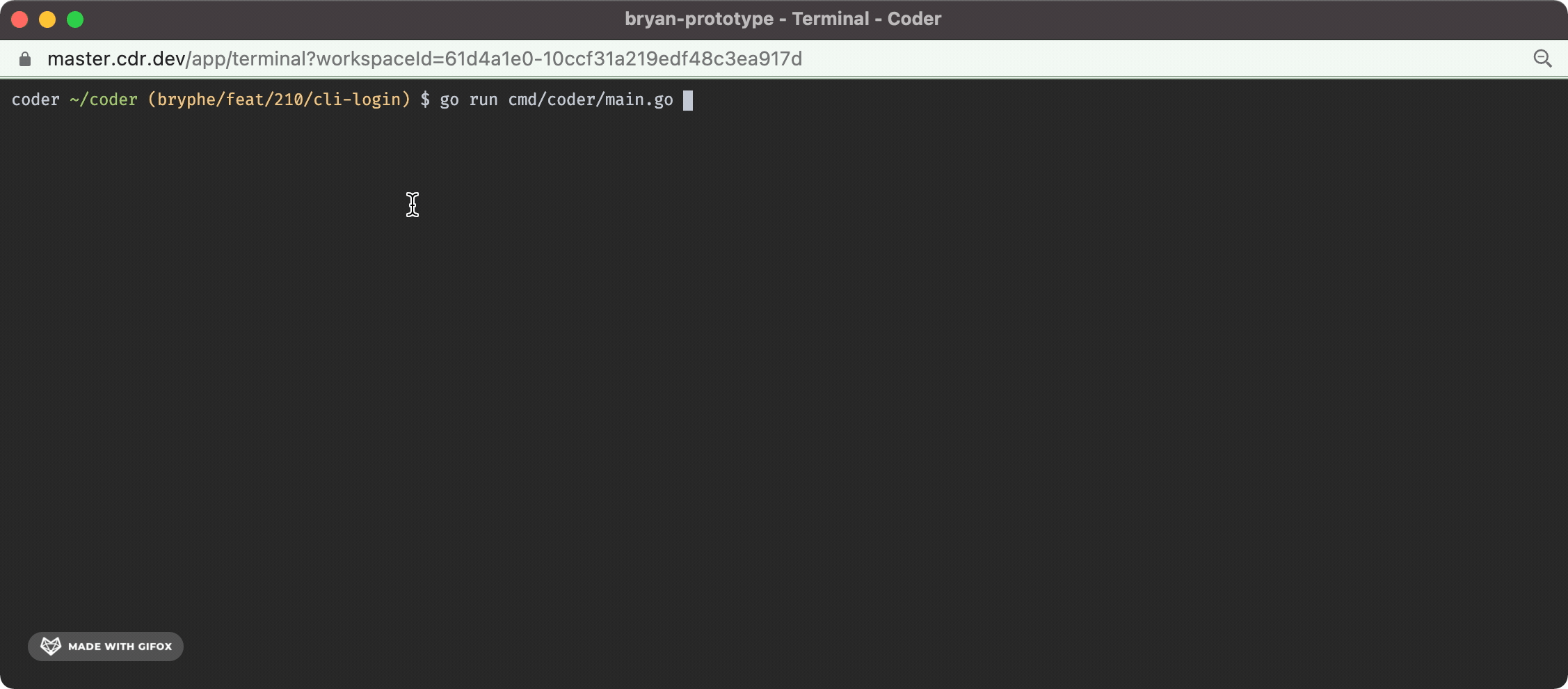mirror of
https://github.com/coder/coder.git
synced 2025-07-12 00:14:10 +00:00
Fixes #210 - this isPR implements `coder login` in the case where the default user is already created. This change adds: - A prompt in the case where there is not an initial user that opens the server URL + requests a session token - This ports over some code from v1 for the `openURL` and `isWSL` functions to support opening the browser - A `/api/v2/api-keys` endpoint that can be `POST`'d to in order to request a new api key for a user - This route was inspired by the v1 functionality - A `cli-auth` route + page that shows the generated api key - Tests for the new code + storybook for the new UI The `/cli-auth` route, like in v1, is very minimal: <img width="624" alt="Screen Shot 2022-02-16 at 5 05 07 PM" src="https://user-images.githubusercontent.com/88213859/154384627-78ab9841-27bf-490f-9bbe-23f8173c9e97.png"> And the terminal UX looks like this: 
139 lines
4.2 KiB
Go
139 lines
4.2 KiB
Go
package codersdk
|
|
|
|
import (
|
|
"context"
|
|
"encoding/json"
|
|
"fmt"
|
|
"net/http"
|
|
|
|
"github.com/coder/coder/coderd"
|
|
)
|
|
|
|
// HasInitialUser returns whether the initial user has already been
|
|
// created or not.
|
|
func (c *Client) HasInitialUser(ctx context.Context) (bool, error) {
|
|
res, err := c.request(ctx, http.MethodGet, "/api/v2/user", nil)
|
|
if err != nil {
|
|
return false, err
|
|
}
|
|
defer res.Body.Close()
|
|
if res.StatusCode == http.StatusNotFound {
|
|
return false, nil
|
|
}
|
|
if res.StatusCode != http.StatusOK {
|
|
return false, readBodyAsError(res)
|
|
}
|
|
return true, nil
|
|
}
|
|
|
|
// CreateInitialUser attempts to create the first user on a Coder deployment.
|
|
// This initial user has superadmin privileges. If >0 users exist, this request
|
|
// will fail.
|
|
func (c *Client) CreateInitialUser(ctx context.Context, req coderd.CreateInitialUserRequest) (coderd.User, error) {
|
|
res, err := c.request(ctx, http.MethodPost, "/api/v2/user", req)
|
|
if err != nil {
|
|
return coderd.User{}, err
|
|
}
|
|
defer res.Body.Close()
|
|
if res.StatusCode != http.StatusCreated {
|
|
return coderd.User{}, readBodyAsError(res)
|
|
}
|
|
var user coderd.User
|
|
return user, json.NewDecoder(res.Body).Decode(&user)
|
|
}
|
|
|
|
// CreateUser creates a new user.
|
|
func (c *Client) CreateUser(ctx context.Context, req coderd.CreateUserRequest) (coderd.User, error) {
|
|
res, err := c.request(ctx, http.MethodPost, "/api/v2/users", req)
|
|
if err != nil {
|
|
return coderd.User{}, err
|
|
}
|
|
defer res.Body.Close()
|
|
if res.StatusCode != http.StatusCreated {
|
|
return coderd.User{}, readBodyAsError(res)
|
|
}
|
|
var user coderd.User
|
|
return user, json.NewDecoder(res.Body).Decode(&user)
|
|
}
|
|
|
|
// CreateAPIKey calls the /api-key API
|
|
func (c *Client) CreateAPIKey(ctx context.Context) (*coderd.GenerateAPIKeyResponse, error) {
|
|
res, err := c.request(ctx, http.MethodPost, "/api/v2/users/me/keys", nil)
|
|
if err != nil {
|
|
return nil, err
|
|
}
|
|
defer res.Body.Close()
|
|
if res.StatusCode > http.StatusCreated {
|
|
return nil, readBodyAsError(res)
|
|
}
|
|
apiKey := &coderd.GenerateAPIKeyResponse{}
|
|
return apiKey, json.NewDecoder(res.Body).Decode(apiKey)
|
|
}
|
|
|
|
// LoginWithPassword creates a session token authenticating with an email and password.
|
|
// Call `SetSessionToken()` to apply the newly acquired token to the client.
|
|
func (c *Client) LoginWithPassword(ctx context.Context, req coderd.LoginWithPasswordRequest) (coderd.LoginWithPasswordResponse, error) {
|
|
res, err := c.request(ctx, http.MethodPost, "/api/v2/login", req)
|
|
if err != nil {
|
|
return coderd.LoginWithPasswordResponse{}, err
|
|
}
|
|
defer res.Body.Close()
|
|
if res.StatusCode != http.StatusCreated {
|
|
return coderd.LoginWithPasswordResponse{}, readBodyAsError(res)
|
|
}
|
|
var resp coderd.LoginWithPasswordResponse
|
|
err = json.NewDecoder(res.Body).Decode(&resp)
|
|
if err != nil {
|
|
return coderd.LoginWithPasswordResponse{}, err
|
|
}
|
|
return resp, nil
|
|
}
|
|
|
|
// Logout calls the /logout API
|
|
// Call `ClearSessionToken()` to clear the session token of the client.
|
|
func (c *Client) Logout(ctx context.Context) error {
|
|
// Since `LoginWithPassword` doesn't actually set a SessionToken
|
|
// (it requires a call to SetSessionToken), this is essentially a no-op
|
|
res, err := c.request(ctx, http.MethodPost, "/api/v2/logout", nil)
|
|
if err != nil {
|
|
return err
|
|
}
|
|
defer res.Body.Close()
|
|
return nil
|
|
}
|
|
|
|
// User returns a user for the ID provided.
|
|
// If the ID string is empty, the current user will be returned.
|
|
func (c *Client) User(ctx context.Context, id string) (coderd.User, error) {
|
|
if id == "" {
|
|
id = "me"
|
|
}
|
|
res, err := c.request(ctx, http.MethodGet, fmt.Sprintf("/api/v2/users/%s", id), nil)
|
|
if err != nil {
|
|
return coderd.User{}, err
|
|
}
|
|
defer res.Body.Close()
|
|
if res.StatusCode > http.StatusOK {
|
|
return coderd.User{}, readBodyAsError(res)
|
|
}
|
|
var user coderd.User
|
|
return user, json.NewDecoder(res.Body).Decode(&user)
|
|
}
|
|
|
|
// UserOrganizations fetches organizations a user is part of.
|
|
func (c *Client) UserOrganizations(ctx context.Context, id string) ([]coderd.Organization, error) {
|
|
if id == "" {
|
|
id = "me"
|
|
}
|
|
res, err := c.request(ctx, http.MethodGet, fmt.Sprintf("/api/v2/users/%s/organizations", id), nil)
|
|
if err != nil {
|
|
return nil, err
|
|
}
|
|
defer res.Body.Close()
|
|
if res.StatusCode != http.StatusOK {
|
|
return nil, readBodyAsError(res)
|
|
}
|
|
var orgs []coderd.Organization
|
|
return orgs, json.NewDecoder(res.Body).Decode(&orgs)
|
|
}
|